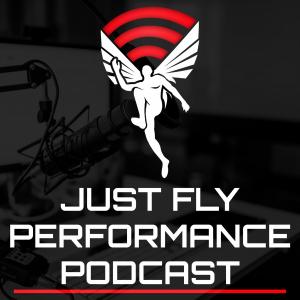Just Fly Performance Podcast

Grant Fowler on Non-Linear Training Programs and the Flow of Exercise Rotation
Today’s episode features Grant Fowler, owner of Fowler Fitness in The Woodlands, Texas. Grant is a creative coach and performance consultant who has been getting some fantastic results with his athletes in the realms of strength, speed and power. Grant is a different thinker who has a distinctive “non-linear” and adaptable style to his training program design, where exercises and their variations are changing from week to week in a manner that allows for regular personal bests. Recent podcast guest Kevin Foster has been training under Grant’s program on his run for the 2020 Olympic Trials, and has been easily breaking many lifting and performance personal bests since working with Grant. I haven’t had a lot of episodes on writing training programs, yet programming for training is one of my favorite things to talk about. It’s good to have a show periodically where we really get into the nuts and bolts of a training program, since this is the most “raw” form of conversation, in regards to what actually happens in training and the subsequent results. The art and science of writing a training program (yes, there is a significant element of art to it) is a multi-factorial venture considering the different physical and psychological systems of the body. On the show today, Grant gets into the fine details on his approach to a fluid training model where exercises and variations of exercises change from week to week in a model inspired by Westside Barbell, but adapted for the needs of athletes. Grant will specifically get into how he rotates the “big lifts” in a max effort format, versus his rotation of the smaller lifts in the program over time. We talk about how the stress level of a given session, including mental fatigue, impacts how often exercises are rotated across the breadth of a training month, and beyond. The thought that resonates in my mind with Grants system is similar to my time working in an old beat “Mixing” program called “Fruity Loops” where various tracks are laid over each other to provide a song. Some lines are brought in more frequently, others less, to create the art-form of the audio experience. In my last 5 years of coaching particularly, I’ve been using a lot of 14-day training cycles, so it was awesome to get inside Grant’s programming mind in creating a variable training stimulus. Today’s episode is brought to you by SimpliFaster, supplier of high-end athletic development tools, such as the Freelap timing system, kBox, Sprint 1080, and more. View more podcast episodes at the podcast homepage. Key Points: Grant’s non-traditional start to his coaching career and it’s impact on his creativity The biggest influences Grant has had in the way he approaches the creation of training methods How Grant has utilized some themes from Westside Powerlifting in regards to the rotation of exercises, in creating his own system for training athletes How Grant rotates “big lifts” versus dynamic and auxiliary exercises in his program Thoughts on the differences between repeating the same workout frequently (such as the Bondarchuk method) versus not repeating the same workout in a 2-3 week time span How Grant programs for those who are tapering, peaking, or in-season How Grant uses and cycles long-duration isometrics in his program Examining a sample monthly training period in Grant’s system “Nothing in a complex system behaves in a linear way” “We are changing the way we do our core exercises (i.e. squat, bench) every week” “The athletes are coming to the gym and always able to hit some type of PR” “The “dynamic effort” days are almost more variable, we’re always cycling exercises and tempos on that dynamic effort day” “The way we implement variation is based on what I feel they haven’t done in a while; if they hit a heavy 8, they won’t hit a heavy 8 the following week, they might do a heavy 3” “A lot of our workouts are written,






 Visit Podcast Website
Visit Podcast Website RSS Podcast Feed
RSS Podcast Feed Subscribe
Subscribe
 Add to MyCast
Add to MyCast